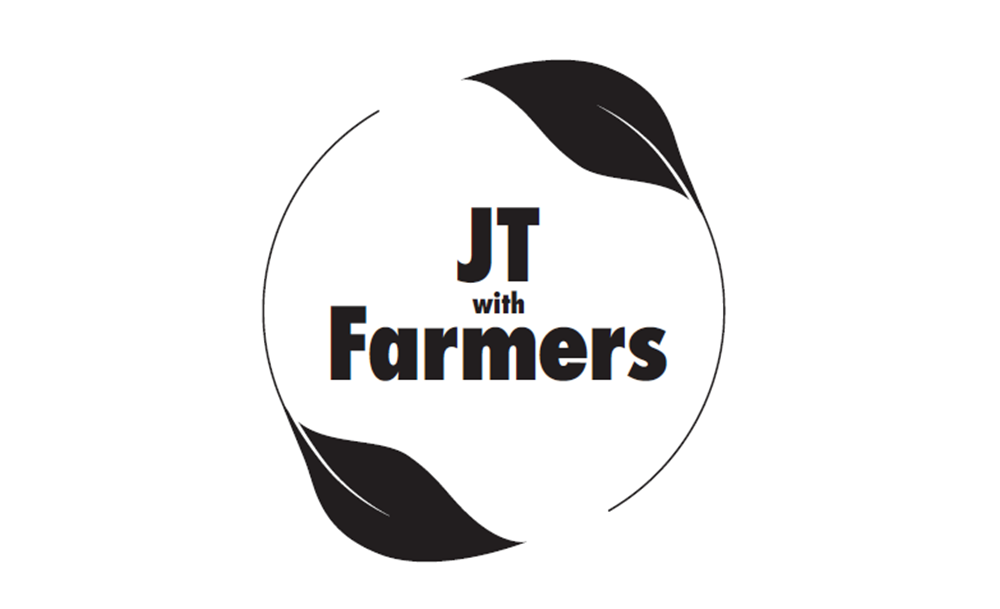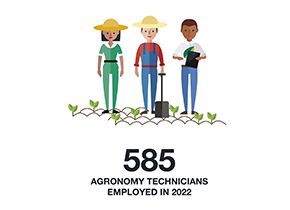One of the sustainability goals that JT works to achieve is to help ensure that Japan’s tobacco industry will be sustainable into the future. In that endeavor, tobacco farmers are essential partners. Our online column “JT with Farmers” spotlights tobacco farmers across Japan, illustrating for readers their passion for agriculture and the challenges they face in farming, as well as new initiatives and their hopes for the future. We believe that keeping close-knit relationships with farmers and working together with them is fundamental to a truly sustainable tobacco industry.
Read about JT with farmers
Sustainable farming practices and farmer livelihoods
How do we work with our leaf suppliers?
Tobacco leaf sourcing is a key part of our supply chain, and a critical component of future business growth. We work closely with our directly contracted growers and third-party leaf merchants to enhance security of supply and leaf provenance. This gives us greater flexibility when responding to changing market requirements.
In 2022, we worked with more than 62,000 directly contracted tobacco leaf growers in Bangladesh, Brazil, Ethiopia, Japan, Malawi, Serbia, Tanzania, Turkey, the US, and Zambia. Contracting leaf growers directly enables us to produce a customized crop, while improving growers’ productivity, leaf quality and leaf integrity. The direct contracting model also allows us to maintain verifiable provenance and traceability of leaf supply.
Various information on tobacco leaf sourcing can be found at followings.
Read about responsible procurement on JT International sustainability website.
Read about supply chain due diligence in farming communities on JT International sustainability website.
Agricultural Labor Practices and Leaf Supply Chain Due Diligence
Our Agricultural Labor Practices (ALP) are based on the International Labour Organization’s conventions and recommendations. They consist of three pillars: tackling child labor, respect for workers’ rights, and ensuring workplace health and safety.
As part of our continuous improvement approach, the ALP program allows us and our suppliers to identify potential labor challenges on tobacco farms and help improve labor practices. This is an integral part of the supply chain due diligence (SCDD) process, and also contributes to the social aspects of grower communities and supports sustainable agriculture overall. Whether we source tobacco directly from growers or through tobacco leaf merchants, our contracted suppliers are committed to implementing our ALP.
Our SCDD is based on a five-step framework: Identify, Prioritize, Respond, Measure, Communicate and Report. Our ALP program helps us identify issues on tobacco farms on a daily basis.
The SCDD process follows the Guidance on Responsible Agricultural Supply Chains provided by the Organization for Economic Co-operation and Development (OECD) and the Food and Agriculture Organization, as well as recommendations by the International Labour Organization. It also follows the United Nations Guiding Principles on Business and Human Rights.
Managing labor issues at country level
Where we contract growers directly, Agronomy Technicians visit farms to provide technical advice on crop management and discuss good labor practices. Where they identify labor-related issues, they report their observations directly into our dedicated enterprise resource planning system. Depending on the nature of the issue, the Agronomy Technicians may also make recommendations to the grower.
The country management analyze and prioritize these observations at country-level SCDD Governance Committee meetings. This enables the selection of improvement measures to address root causes and respond to adverse impacts in the most appropriate way. We track the effectiveness of the response using KPIs, internal evaluation, assessments, and on-site investigations. We also consult relevant stakeholders, such as government authorities, civil society, members of affected communities, workers’ organizations and workers.
Our main objective at present is to align all our processes with the five-step framework. To ensure a streamlined and consistent approach, we continuously map synergies between our SCDD process and the ALP program with the Sustainable Tobacco Program, an industry-wide platform enabling businesses to collaborate on human rights, environmental issues, and other sustainability challenges, and to drive sustainable agriculture through a continuous improvement process.
Read more on ALP in our booklet
ALP progress update
Target
-
AGRICULTURAL LABOR PRACTICES
-
We will implement our Agricultural Labor Practices (ALP) program in all sourcing countries by 2025.
Progress
| Towards the 2025 ALP target | 2022 Progress |
| 100% of our supplying entities to report on ALP | 94% of our supplying entities reported against ALP |
| 100% of our growers to be covered by ALP | 100% of our directly contracted growers and 98% of our leaf merchants' growers were covered by ALP |
| 100% of tobacco leaf volumes to be covered by ALP | 83% of our volumes were covered by ALP |
Historical data
Our target is to implement ALP in all the countries we source from by 2025. Our sourcing base changes from year to year due to new acquisitions or closures, demand to supply impact, and climate change. In spite of these changes, we made progress in 2022 by implementing ALP in Bangladesh and Ethiopia, conducting supply chain impact assessments in Tanzania, Brazil and Indonesia to enable the development of targeted action plans, and delivering supply chain due diligence webinars and learning platforms. We have a clear plan to continue the progress in 2023. A credible, impactful implementation of our programs and processes requires time and effort.
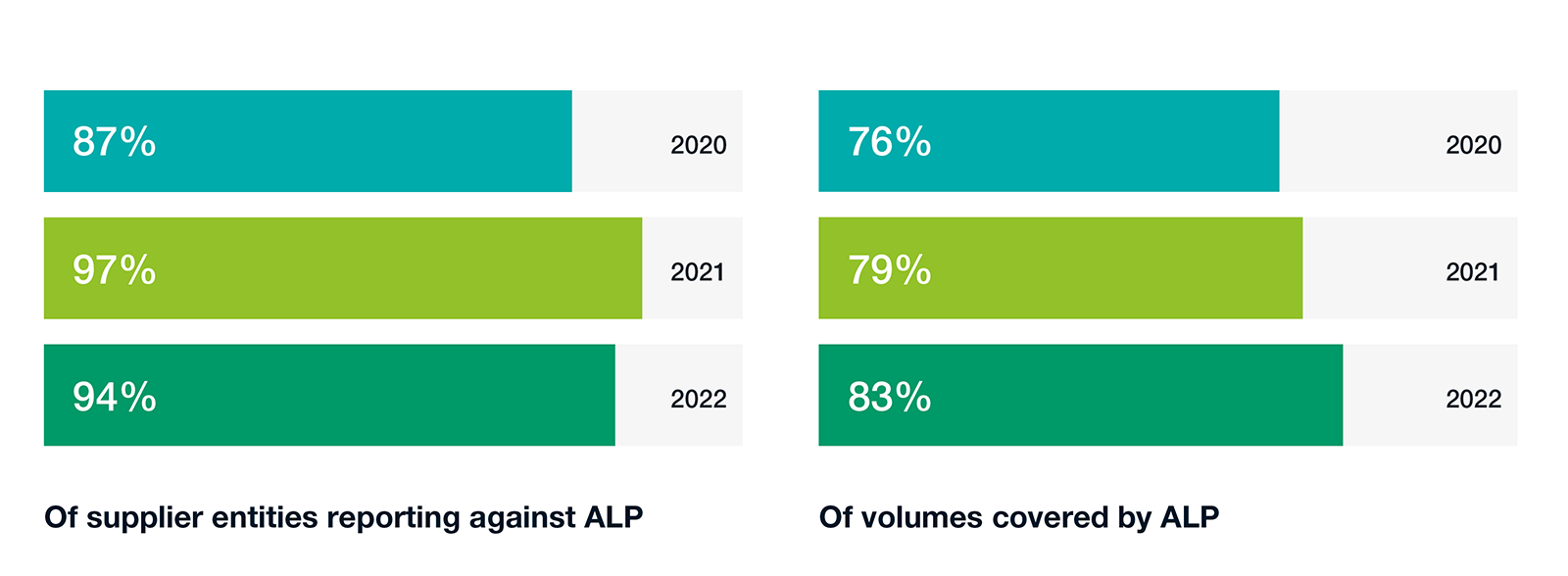
Find out more about how we plan to achieve this target, below.
100% of our supplying entities to report on ALP
Progress so far: of all the entities that provided us with tobacco leaf, either directly or through leaf merchants, 94% reported against ALP in 2022.
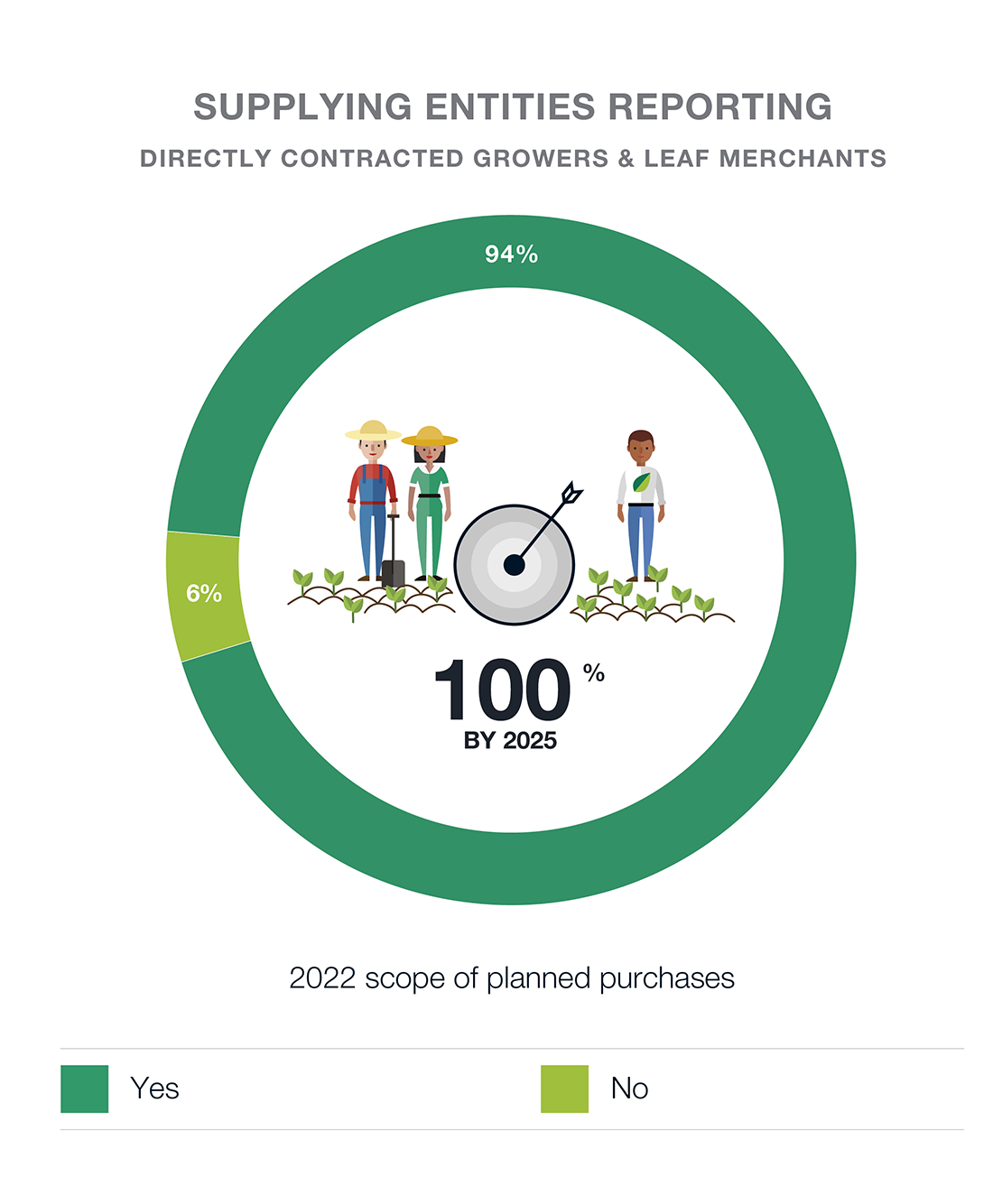
100% of our growers to be covered by ALP
Progress so far: in 2022, 100% of our directly contracted growers and 98% of the growers supplying through our leaf merchants were covered by ALP.
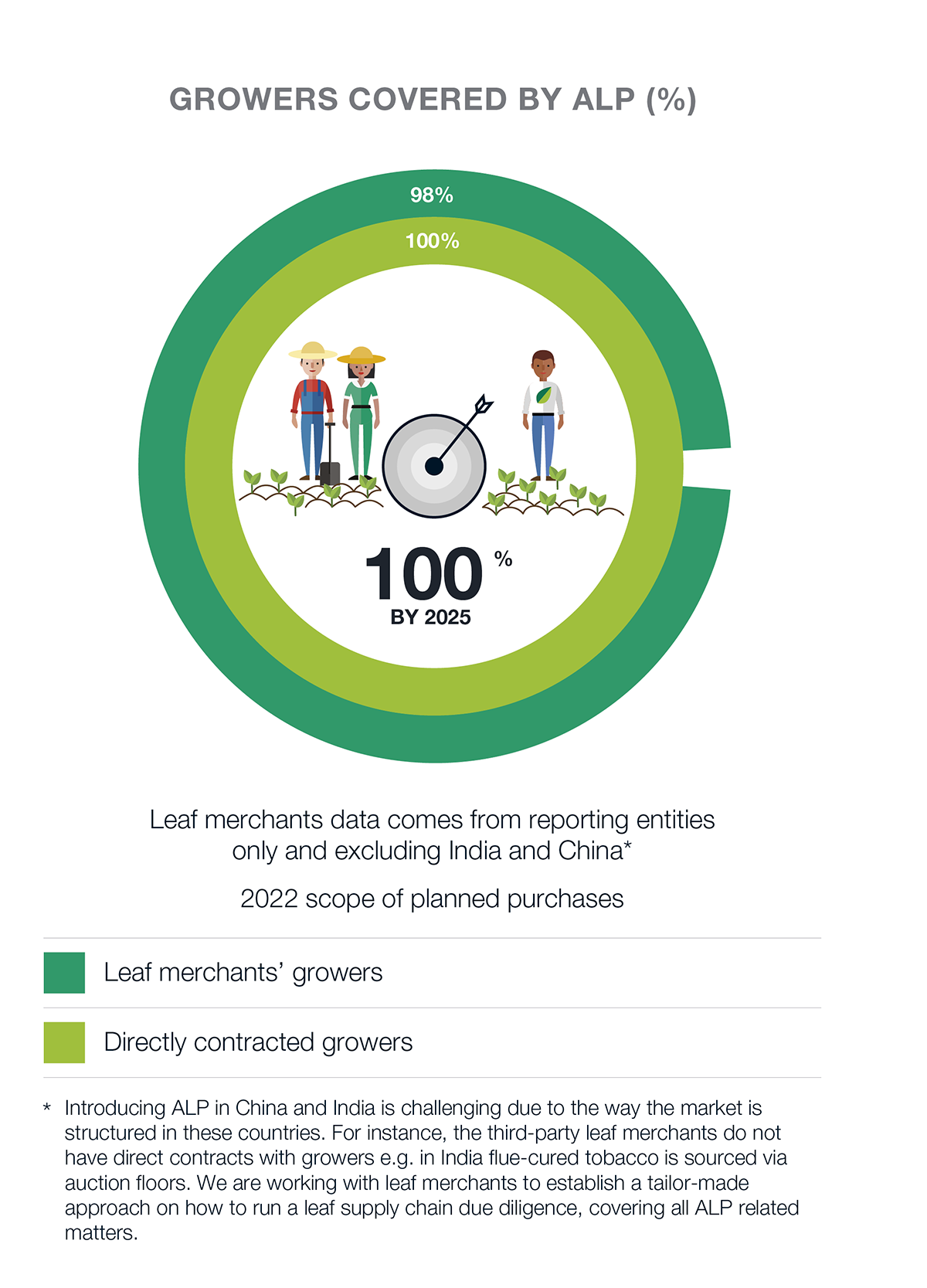
100% of tobacco leaf volumes to be covered by ALP
Progress so far: In 2022, 83% of our volumes were covered by ALP.
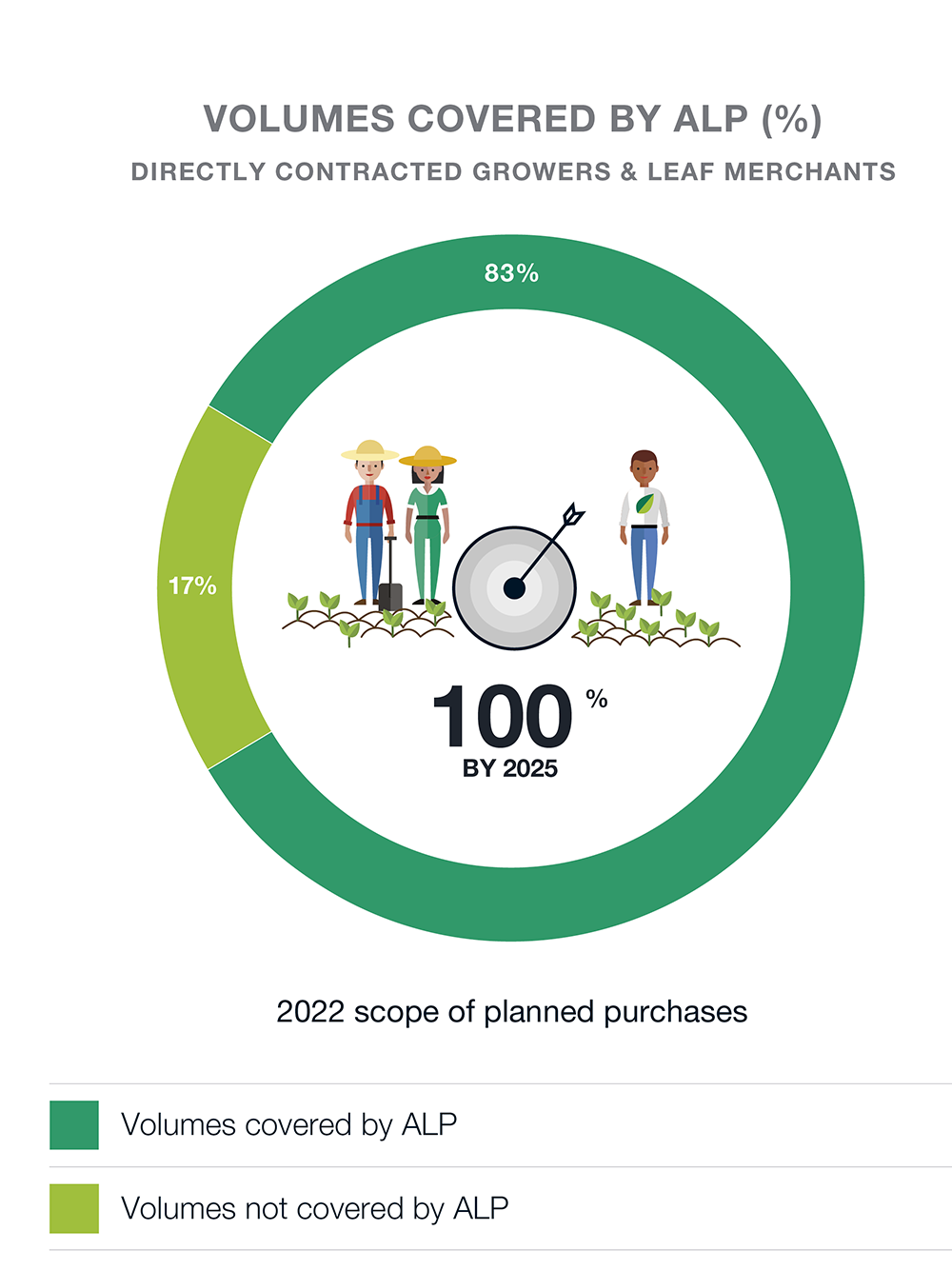
Sustainable Tobacco Program
Our international tobacco business is one of seven global manufacturers participating in the Sustainable Tobacco Program (STP) Steering Committee. Two manufacturers joined the program in 2022, widening and strengthening the STP network. STP is a risk-based program (with a focus on mapping and addressing high-risk areas and priorities), and a collaborative initiative to enable continuous improvement in relation to supply chain due diligence. It is also an impact-driven program. The aim is to improve the sector’s environmental and social footprints, to contribute towards meeting the United Nations’ Sustainable Development Goals, and to enable transparent communication of responsible practices across the supply chain.
Since 2019, we have been working with other manufacturers, leaf merchants, external experts, and various organizations and service providers to further develop STP. Participants work together on eight themes, including Human and Labor Rights.
The development phase of the program was completed in June 2021, and full implementation is ongoing. One Peterson continues to support the program in the role of STP Secretariat.
All our leaf merchants and vertically integrated origins are expected to submit self-assessments for each crop season*. These assessments cover all eight of the STP’s themes: Water, Human and Labor Rights, Livelihoods, Climate Change, Soil Health, Crop, Natural Habitats and Governance. The countries and themes for the assessments are selected following a risk matrix. Six detailed and focused in-country assessments were executed in 2022, results are being analyzed and learning embedded in assessments going forward. Action plans based on those assessments are required to be developed and their progress is monitored. Currently, two more in-country assessments are ongoing with several more planned for 2023.
The STP secretariat is performing continuous risk assessment data substantiation. This enables smart use of data and support the dialogue for improvement of JTI’s supply chain due diligence process and global view of industry collaboration.
*Our level of exposure to tobacco is over 90%.
Achieving Reduction of Child Labor in Support of Education (ARISE)
Our flagship program ARISE - Achieving Reduction of Child Labor in Support of Education - has been committed to tackling child labor in our tobacco growing communities since 2011. Initially developed by JTI, the International Labour Organization (ILO), and non-profit organization Winrock International, ARISE aims to end child labor in communities where JTI sources tobacco leaf. Today it continues to drive positive change by implementing robust solutions to prevent child labor.
We believe that the only way to achieve a long-lasting solution to the problem of child labor is through the integrated efforts and cooperation of multiple stakeholders. We know that our success depends on understanding child labor in the context of wider economic, social and cultural factors, and that success can only be achieved with the socio-economic transformation of smallholder farmers in rural agricultural communities. Experience has taught us that the long-term solution to child labor is not simply to remove children from work, but to address the causes that allow child labor to exist, and to ensure that children and their families have viable alternatives.
Through ARISE, we educate children, families, farmers and communities about the need to end child labor. We listen to their concerns and help them understand the long-term benefits of educating children. We provide families with the chance to develop skills and find new ways to earn an income. We train farmers and communities so they can find new ways of working and change cultural beliefs that put children at risk. We provide schools with resources, teachers with training, and governments with information so they can create relevant laws and enforce them. Our activities align with national, regional and local government policies to improve regulatory frameworks in support of improving labor practices, specifically reducing and eliminating child labor.
Read more about the ARISE program
Case study
Promoting Good Agricultural Practices
